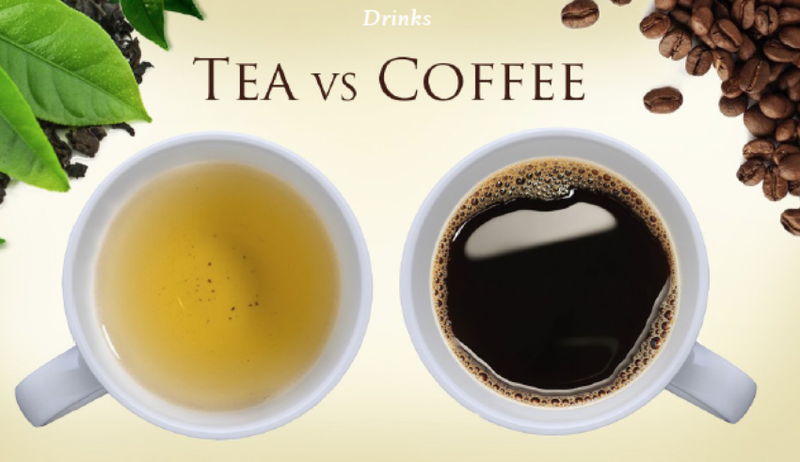Beverages may come in different kinds and forms. Each of them has their own beneficial effects, making them totally unique than any other drinks. Coffee and tea are some of the most common and most loved beverages. For some, a hot cup of coffee is better taken in the morning to give energy for the entire day. While a soothing cup of tea is taken before bedtime to relax the mind and the body after a stressful day. The competition between the drink of choice continues. Then you may want to learn more about their similarities and differences to help you make better choice.

Tea vs. Coffee: Which One Is Better?
Taste
When comparing coffee and tea, the first characteristic that will be considered is the taste and aroma. One should ensure that the taste is enough to avoid the addition of sugar and sweeteners.
Coffee usually originates from the different regions around the globe. Most of them vary in the intensity and bitterness. Coffee tends to be more acidic than tea which sometimes leads to stomach problems and issues such as heartburn and reflux. Black coffee is best served when hot. The addition of milk and cinnamon can be done for an improved taste.
Tea varieties are endless depending on the extent of how the leaves are processed and produced. Green tea has the highest amount of antioxidant due to the less process it underwent. Some herbal teas may come from plant’s roots, giving more nutritional values but unusual taste. Teas are best served unsweetened. The addition of honey can be done to improve the taste.
Caffeine Contents
When comparing tea vs. coffee, both contain caffeine which gives energy to the body. The amount of caffeine greatly varies on the type of drink as well as the method of preparation.
Coffee tends to have a higher amount of caffeine than tea. A cup of brewed coffee usually contains around 100 mg of caffeine while a cup of soothing tea usually gives 15 to 70 mg of caffeine. According to studies, the recommended daily dosage of caffeine in the body should be about 400 mg per day.
Effects to Boost Energy
Being an energy booster, caffeine increases the energy levels in the body. The effect of caffeine from coffee and tea may greatly vary from each other.
Coffee has more amount of caffeine making it a quick energy booster. People tend to drink coffee in the morning for instant absorption and effect in the body. It also allows one to stay awake for longer hours especially at night.
Tea gives a slow burning effect that helps sustain the energy boost of the body. Other than caffeine, tea also contains amino acids which give anti-anxiety effects but with an alert and relaxed state. It is better taken at night for a more soothing and relaxing effect.
Health Benefits
When choosing between tea vs. coffee, you may want to know how they can benefits you to choose wisely.
Research shows that certain amounts of coffee fight several diseases such as:
Drinking 1 cup of coffee daily lowers the risk of non-melanoma skin cancer to about 11%.
Women drinking 4 cups of coffee a day reduce the risk of type 2 diabetes to approximately 56%.
Caffeine components significantly lower the incidence of Parkinson’s disease, especially in men.
Moderate coffee drinkers have 20% lower risk of heart disease.
Topical and regular application of caffeine makes cellulite appear smoother.
Depression is lowered by 15% by drinking 3 cups of coffee daily.
The risk of having endometrial cancer is reduced because coffee can lower insulin and estrogen levels in the body.
Studies reveal that drinking tea helps fight several diseases such as:
Components of tea neutralize the free radicals, leading to lower chances of cancer.
Sipping 3 to 6 cups of tea daily have 45% less risk of dying from heart disease.
Phytochemicals in tea protect neurons that help prevent Parkinson’s disease.
Popular anti-aging choice due to the high antioxidant and anti-inflammatory content.
Regular drinking of green tea lowers the risk of breast cancer.
Reduced body fat and lowered blood pressure are experienced by consuming green tea extract.
Drinking 1 or more cups of green tea helps prevent gingivitis and even tooth loss.
Cons and Negative Effects
Drinking coffee may lead to some negative effects, such as:
Increased cholesterol level due to the natural substance present in unfiltered coffee.
Higher acidic content which is not suitable for people with digestive issues.
Reduced bone density, leading to higher risk of fracture.
Sensitivity to coffee may lead to jittery and anxiousness.
Natural diuretic which flushes water from the body and then may lead to possible dehydration.
Drinking tea may lead to some negative effects, such as:
Stained or tinted teeth caused by the components present in tea.
Reduced iron level due to tannins that interfere with the absorption of plant-based iron.
Increase the sugar level in the body caused by the sugar present in carbonated tea.
Stomach issues such as sour stomachs and aches due to too much drinking of tea.
The debate on which is better between tea vs. coffee may not come to an end. But it is clear that both coffee and tea are the healthier drinks available. Both of them have their own characteristics that make them unique from each other. Consider drinking both of them daily and in moderate amounts to achieve the best physical, mental, and health benefits. Drink accordingly depending on the mood and personal preference. And remember to enjoy every sip, whether it is coffee or tea.
View All Comments /Add Comment